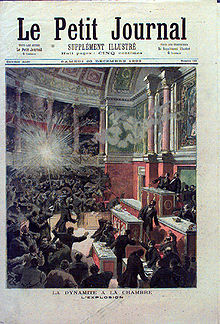Lois scélérates

As Lois Scélérates (German as: Criminal law ) a number of French laws in response to the years 1893 and 1894 is known anarchist bombings were enacted. The laws were designed to restrict the freedom of the press provisions of 1871 in the Third French Republic and prevent anarchist agitation.
The first law was passed on December 11, 1893, two days after Auguste Vaillant's bombing of the French National Assembly, in which around 50 people were injured. This law expressly forbade the support of criminal acts, which resulted in repressive measures against anarchist papers like Le Père Peinard . A week later, a second law was passed, which was directed against persons who were directly or indirectly involved in propaganda of the crime actions, even if the crime was not carried out. The last law of these lois scélérates was passed on July 28, 1894 and prohibited all anarchist and anti-militarist propaganda .
During this time over 400 anarchists were arrested, which reached a new high after the assassination attempt by Sante Geronimo Caserio on Sadi Carnot .
The term is still used today to refer to harsh and unjust laws, especially counter-terrorism laws .
Web links
Les lois scélérates 1894 (fr.)